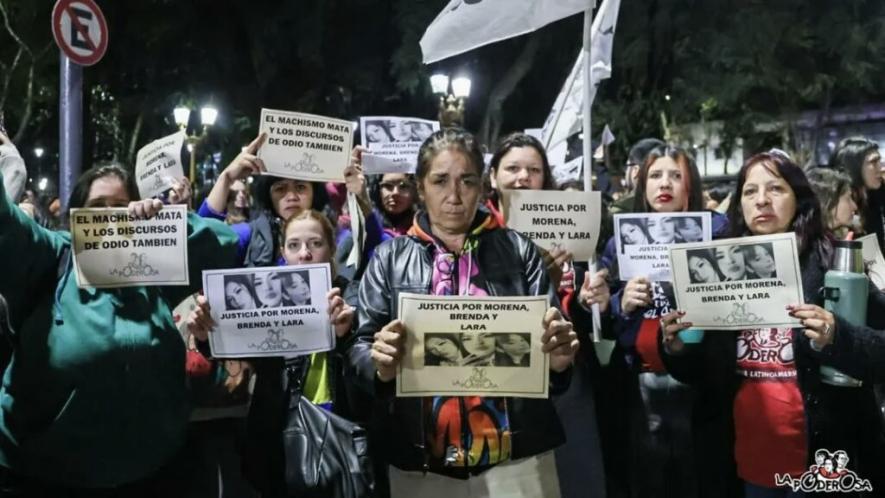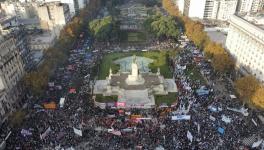Triple Femicide Shocks Argentina, Analysts Cite Neoliberal Policies

Mass protests against the femicide of two young women and one girl in the province of Buenos Aires. Photo: La Garganta Poderosa
Two 20-year-old women and a 15-year-old girl were tortured and murdered in the south of Greater Buenos Aires. The bodies of Morena Verri, Brenda Loreley Del Castillo, and Lara Morena were found dismembered and buried in a house in the city of Florencio Varela on September 24, although it is believed that they were murdered on September 19.
According to authorities, the two young women and the girl were tricked into getting into a white van, which was supposed to take them to an event that never took place.
The so-called “triple femicide” is linked to an apparent revenge attack by a transnational drug trafficking organization. The district’s minister of security, Javier Alonso, reported that the torture and murders were broadcast live on a private social media group. In the broadcast, the criminals claimed that the action was carried out to send a warning message to the drug trafficking organization. “This is what happens to those who steal my drugs,” said one of the men who appears in the video, according to Alonso.
At present, twelve people have been arrested, although Alonso stated that there are many more individuals linked to this heinous crime. The governor of Buenos Aires, Axel Kicillof, said of the crime: “Faced with an event of this nature, we must be serious and responsible so that it is understood that drug trafficking knows no borders or jurisdictions, and also exercises all forms of gender-based violence … We will continue to report as the justice system moves forward.”
Protests reject patriarchal violence
As soon news broke about the murder of the three women, various social movements and feminist groups called for a general mobilization throughout Argentina to protest the crime. Thousands of people marched through the streets and squares of Córdoba, Mar del Plata, La Plata, Mendoza, Paraná, Rosario, Salta, Corrientes, and Buenos Aires.
For now, the Ni Una Menos collective has called for another demonstration on September 27, under the slogan “No life is disposable”.
The crime was not simple “an act of revenge”
Many have emphasized that the triple femicide did not take place in a vacuum, and that structural policies played a key role.
Feminist journalist with El Grito del Sur, Belén del Huerto told Peoples Dispatch that, “The economic decline of Argentine families [as a result of Milei’s neoliberal policies] means that several members have two or three jobs. It is in this context that we must understand the case of the two 20-year-old women and the minor who, according to the accounts of their family and friends, were working as prostitutes.”
Del Huerto affirms that in this case, the state is absent and that Milei’s administration has eliminated public gender policies, in addition to the high rate of unemployment among young people: “A minor engaging in prostitution is sexual exploitation.”
Argentina today, she affirms, “is a state that criminalizes the most vulnerable young women.”
In addition, the Argentine journalist highlights that the fact that the torture and murder were filmed is part of a “pedagogy of cruelty that this system is trying to impose, with these criminal groups as guarantors of the patriarchal and economic reproduction that weighs most heavily on the bodies of women and girls.”
That is why Del Huerto emphasizes the importance of understanding these crimes in context, rather than simply as “settling scores”. “There is a narco-state surviving in Argentine neighborhoods that uses young people as disposable commodities. In Argentina, we are experiencing a process in which the state is withdrawing, and drug trafficking is advancing. In view of this, it is important to say that the first people to be used as commodities by these narco-criminal groups are girls, adolescents, and young women.”
That is why she points to the responsibility of the neoliberal state in the advance of these criminal groups, as it is more a case of a state that seeks to reduce itself to its minimum expression: “The state’s absence from issues such as human trafficking, assistance to victims of gender violence, and the defunding of cooperative economy projects in working-class neighborhoods is causing the advance of drug trafficking.”
Finally, Del Huerto warned about the consequences of this neoliberal drift promoted by Milei’s government: “For us feminists, it is important to emphasize the importance of the gender public policies that Milei withdrew. We have done important work to show that if these public policies are lacking, if this economic crisis continues to advance, if our country continues to choose foreign debt as a way to finance a political campaign to keep a neoliberal government in power, and if, ultimately, the state withdraws from various areas, we will suffer more crimes like these, as drug trafficking will advance.”
Courtesy: Peoples Dispatch
Get the latest reports & analysis with people's perspective on Protests, movements & deep analytical videos, discussions of the current affairs in your Telegram app. Subscribe to NewsClick's Telegram channel & get Real-Time updates on stories, as they get published on our website.
























